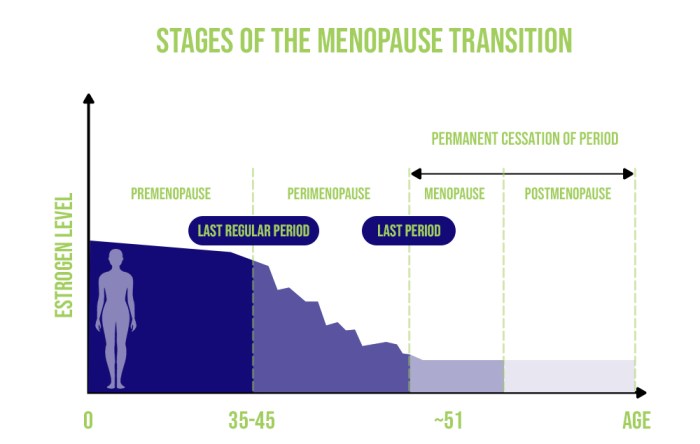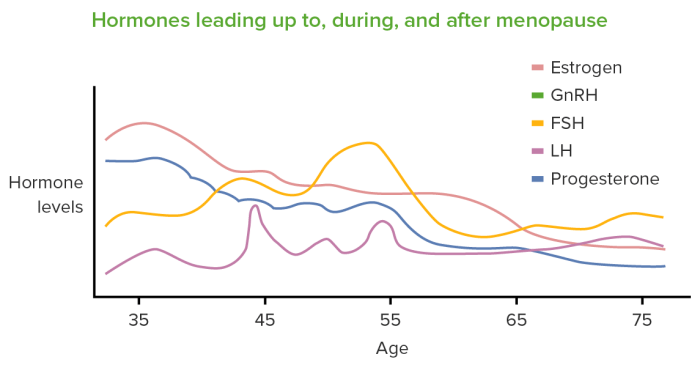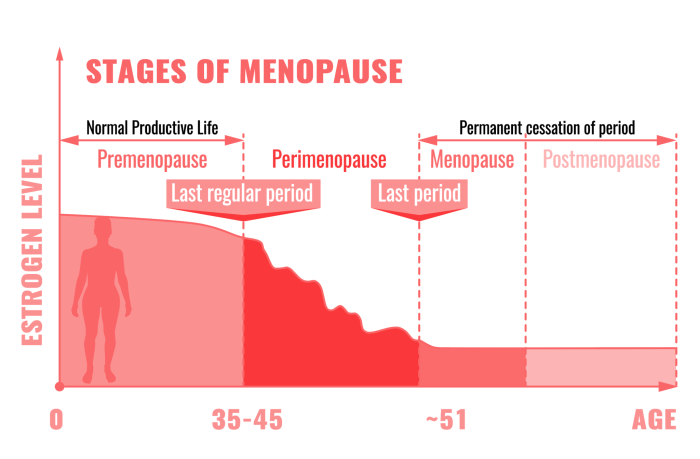Hormones for menopause – Menopause, a natural transition in a woman’s life, brings about a myriad of physical, emotional, and cognitive changes. At the heart of these changes lie hormones, particularly estrogen and progesterone, whose decline during menopause triggers a cascade of symptoms and potential health concerns.
Understanding the role of hormones in menopause is crucial for managing these changes effectively.
Hormone Replacement Therapy (HRT) for Menopause

Hormone replacement therapy (HRT) is a treatment option for women experiencing symptoms of menopause. It involves taking hormones, such as estrogen and progesterone, to replace the hormones that the body stops producing during menopause.
Benefits of HRT, Hormones for menopause
HRT can provide relief from a variety of menopausal symptoms, including:
- Hot flashes
- Night sweats
- Vaginal dryness
- Mood swings
- Insomnia
HRT can also help to prevent bone loss and reduce the risk of osteoporosis.
Risks of HRT
HRT is not without risks. Some of the potential risks include:
- Increased risk of breast cancer
- Increased risk of blood clots
- Increased risk of stroke
- Increased risk of heart disease
The risks of HRT vary depending on the type of HRT used, the dose, and the duration of use.
Types of HRT
There are different types of HRT available, including:
- Estrogen-only therapy
- Progesterone-only therapy
- Combined therapy (estrogen and progesterone)
The type of HRT that is best for a particular woman will depend on her individual needs and risk factors.
Deciding Whether to Use HRT
The decision of whether or not to use HRT is a personal one. Women should weigh the benefits and risks of HRT carefully before making a decision.
Factors to consider when deciding whether to use HRT include:
- The severity of menopausal symptoms
- The risks of HRT
- The woman’s age
- The woman’s overall health
Women who are considering HRT should talk to their doctor about the benefits and risks of HRT and to decide if it is right for them.
Alternative Therapies for Managing Menopausal Symptoms

Menopause can bring a range of physical and emotional symptoms, which can significantly impact a woman’s quality of life. While Hormone Replacement Therapy (HRT) remains a common treatment option, alternative therapies offer non-hormonal approaches to managing these symptoms. These alternatives include lifestyle modifications, herbal remedies, and acupuncture.
Lifestyle Modifications
Adopting a healthy lifestyle can significantly alleviate menopausal symptoms. Regular exercise, a balanced diet, and adequate sleep can improve overall well-being and reduce the severity of hot flashes, mood swings, and fatigue. Exercise, in particular, has been shown to enhance endorphin production, which has mood-boosting effects.
A diet rich in fruits, vegetables, and whole grains provides essential nutrients that support hormonal balance.
Herbal Remedies
Certain herbs have been traditionally used to treat menopausal symptoms. Black cohosh, for instance, is believed to have estrogen-like effects that can reduce hot flashes and night sweats. Evening primrose oil, rich in gamma-linolenic acid, has been shown to alleviate breast tenderness and mood swings.
It is important to note that herbal remedies should be used with caution and under the guidance of a healthcare professional, as they may interact with certain medications or have side effects.
Acupuncture
Acupuncture is an ancient Chinese medicine technique that involves inserting thin needles into specific points on the body. Studies have suggested that acupuncture can effectively reduce hot flashes, improve sleep quality, and alleviate mood symptoms during menopause. Acupuncture is generally considered safe, but it is essential to seek treatment from a licensed and experienced acupuncturist.By incorporating these alternative therapies into a comprehensive menopause management plan, women can explore non-hormonal options to alleviate their symptoms and improve their overall well-being during this transition.
It is crucial to consult with a healthcare professional to determine the most appropriate approach based on individual needs and circumstances.
Monitoring and Managing Hormonal Health During Menopause

Menopause is a natural transition that can lead to hormonal imbalances and various health concerns. Regular medical check-ups during this time are crucial to ensure overall well-being and detect any underlying issues early on.During these check-ups, healthcare providers may conduct various tests to assess hormonal levels, including:
- Follicle-stimulating hormone (FSH) and luteinizing hormone (LH) tests: These hormones regulate ovulation and can indicate the onset of menopause.
- Estrogen and progesterone tests: These hormones play a vital role in maintaining reproductive health and can be measured to determine hormonal imbalances.
In addition to hormonal testing, healthcare providers may also conduct general health screenings to assess blood pressure, cholesterol levels, and bone density.Lifestyle changes can also support hormonal balance during menopause. These include:
- Maintaining a healthy diet: Eating a balanced diet rich in fruits, vegetables, and whole grains can help regulate hormone levels and support overall well-being.
- Regular exercise: Engaging in regular physical activity can improve circulation, reduce stress, and promote hormonal balance.
- Stress management: Chronic stress can disrupt hormonal balance. Techniques such as yoga, meditation, and deep breathing can help manage stress levels.
By following these recommendations, women can effectively monitor and manage their hormonal health during menopause, ensuring their well-being and quality of life during this transition.
Final Review
Managing hormonal health during menopause involves a multifaceted approach that includes regular check-ups, lifestyle modifications, and potential hormone replacement therapy or alternative therapies. By staying informed and working closely with healthcare providers, women can navigate the menopausal transition with confidence and well-being.
Question & Answer Hub: Hormones For Menopause
What are the most common physical symptoms of menopause?
Hot flashes, night sweats, and vaginal dryness are among the most prevalent physical symptoms.
Can menopause affect cognitive function?
Yes, hormonal changes during menopause can impact cognitive function, potentially leading to memory lapses and difficulty concentrating.
What is hormone replacement therapy (HRT)?
HRT involves the use of hormones, such as estrogen and progesterone, to alleviate menopausal symptoms and reduce the risk of certain health conditions.
Are there alternative therapies for managing menopausal symptoms?
Yes, non-hormonal therapies like lifestyle modifications, herbal remedies, and acupuncture may provide relief from menopausal symptoms.
How can I monitor my hormonal health during menopause?
Regular medical check-ups, including blood tests to assess hormone levels, are essential for monitoring hormonal health during menopause.